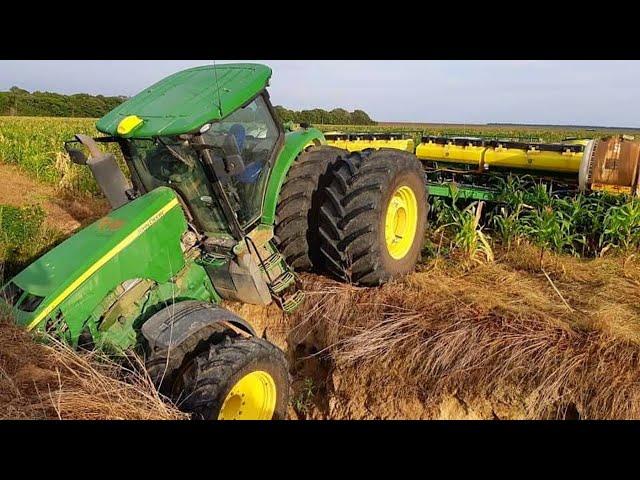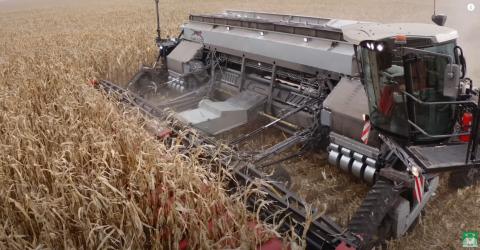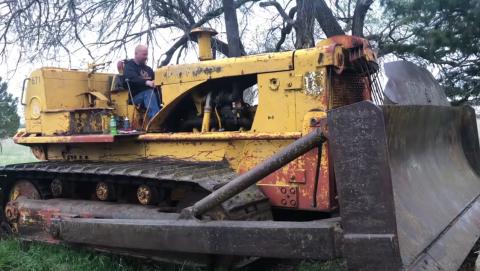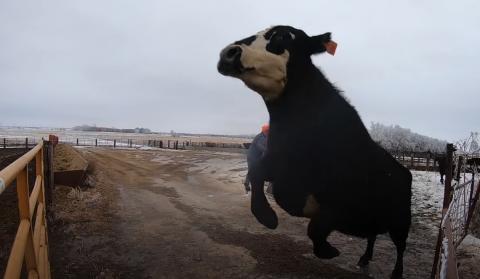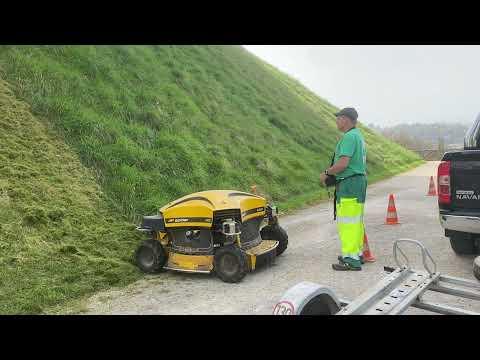In this video viewers spend in the field with a 235 hp CASE INTERNATIONAL 9230 Tractor & GEHL 860 Forage Harvester chopping corn in the mud. The video shares the production history, specifications and original price tag of the Case IH 9230 4wd tractor and two GEHL 860 Forage Harvester.
Connect with Big Tractor Power @ http://www.bigtractorpower.com
E-mail [email protected]
See More Great Tractor Videos - Subscribe ➜ https://www.youtube.com/bigtractorpower
Share this Video: ➜ https://youtu.be/K_AsDcRThere have been times when we could not predict the condition of the places where we drove. It is not possible for our car, which is likely to get stuck in areas such as mud and dense sand, to get out of there by just giving gas. The move you make can sink you even more into the mud. If your location is close to a point where roadside assistance will come, you can ask for help and get out of the area where you are stuck. If you do not have such a situation, it is possible to save your car from mud or sand with the methods we will tell you about. Let's look at the methods together. You should not forget that there are some points you need to know in order not to make a wrong move to save your vehicle from where it was stuck. Here are some things you should know: Continuing to load on the gas, thinking that every time we step on the gas while we are stuck in the mud, thinking that the car will come out of the stuck place and continue on its way, can damage the tires, transmissions, driveline, and also cause the car to go deeper. If the vehicle has completely lost contact with the ground and the wheels are floating in space, you should know that what you need to do is to restore the vehicle's contact with the ground. Using the effect of the momentum, we should give acceleration to the vehicle by lightly touching the accelerator pedal without being loaded, and we should remove the wheel from the floating space. The communication factor should also not be forgotten. It would be more useful if we tell the driver the condition of the wheel and what is going on there. Finally, the methods you will read below may vary depending on how deep the vehicle is stuck in the mud or sand. Do Due Diligence First of all, you should learn the size of your vehicle's puncture by doing due diligence. For example, if you have a 4×2 drive car, you should take a good look at how deep your vehicle goes, whether the undercarriage is in contact with the ground, and whether the wheels with traction are in the gap or not, and you should determine your methods accordingly. Towing with a Second Vehicle Using 4X4 vehicles for this method will give you the best results in terms of traction. As a safety precaution, you should test the strength of the tow ropes that may break. Otherwise, the piece breaking off due to horsepower may create a lead effect and damage the surroundings. We start the rescue process with the 4X4 vehicle passing in front of the car stuck in the mud. We connect a quality rope that is not likely to break from the towing vehicle to what we call the tow bar on the front of the vehicle to be towed. In some vehicles, the location of this place may vary. Then, while starting the process, we prepare an environment where both drivers will be in contact simultaneously. A walkie-talkie or telephone can help us with this. After communicating with the vehicle in front, we apply the rhythm gas pedal, which we have determined among ourselves, to press and release. We can increase the reaction rhythms that I give to the gas by detecting whether the vehicle is moving or not every time we apply it. After a while, the car will come out of the mud with the joint movement of two cars giving gas with the same rhythm. Oscillation Method This method is a method you can use when your vehicle is not too tight. If your vehicle has not been completely taken over by mud or sand, there is a move you need to do without causing your vehicle to sink further by giving your vehicle sudden gas. You can turn the steering wheel to the right and left at regular intervals and load the accelerator pedal at regular intervals in the same way, so that your vehicle continues from where it left off. Digging Method By digging under the muddy wheel with a shovel, you can renew the contact area and ensure that the vehicle clings to the road. This method is one of the common methods often used to recover the vehicle from the road. Pieces with Large Surface Area If we give an example of pieces with large surface area, we can say wood pieces. If we place large pieces of wood and various objects in the area where the vehicle is clinging, and make it a dry and gripping surface, the traction will increase and the car will have an easier time climbing forward. Weight Method With this method, you can have a fun rescue operation. By adding weight to the part of the wheels that have traction, you can increase the dependence of the vehicle on the contact area and make it experience better climbing. This weight is usually provided by 2-3 people jumping on the vehicle. If there are no people around to climb on the car, you can tie any heavy object to the car. Tire Pressure Method Tire decompression method is often used as a last resort as it is dangerous. Having a tire pump and compressor can be useful for reducing pressure. Reducing the tire pressure will make the wheel flat and will make it easier to hold on to the ground. In places such as sand and mud, the rubber is kneaded with the ground and succeeds in passing the area it needs to pass.-r5M
Connect with Big Tractor Power @ http://www.bigtractorpower.com
E-mail [email protected]
See More Great Tractor Videos - Subscribe ➜ https://www.youtube.com/bigtractorpower
Share this Video: ➜ https://youtu.be/K_AsDcRThere have been times when we could not predict the condition of the places where we drove. It is not possible for our car, which is likely to get stuck in areas such as mud and dense sand, to get out of there by just giving gas. The move you make can sink you even more into the mud. If your location is close to a point where roadside assistance will come, you can ask for help and get out of the area where you are stuck. If you do not have such a situation, it is possible to save your car from mud or sand with the methods we will tell you about. Let's look at the methods together. You should not forget that there are some points you need to know in order not to make a wrong move to save your vehicle from where it was stuck. Here are some things you should know: Continuing to load on the gas, thinking that every time we step on the gas while we are stuck in the mud, thinking that the car will come out of the stuck place and continue on its way, can damage the tires, transmissions, driveline, and also cause the car to go deeper. If the vehicle has completely lost contact with the ground and the wheels are floating in space, you should know that what you need to do is to restore the vehicle's contact with the ground. Using the effect of the momentum, we should give acceleration to the vehicle by lightly touching the accelerator pedal without being loaded, and we should remove the wheel from the floating space. The communication factor should also not be forgotten. It would be more useful if we tell the driver the condition of the wheel and what is going on there. Finally, the methods you will read below may vary depending on how deep the vehicle is stuck in the mud or sand. Do Due Diligence First of all, you should learn the size of your vehicle's puncture by doing due diligence. For example, if you have a 4×2 drive car, you should take a good look at how deep your vehicle goes, whether the undercarriage is in contact with the ground, and whether the wheels with traction are in the gap or not, and you should determine your methods accordingly. Towing with a Second Vehicle Using 4X4 vehicles for this method will give you the best results in terms of traction. As a safety precaution, you should test the strength of the tow ropes that may break. Otherwise, the piece breaking off due to horsepower may create a lead effect and damage the surroundings. We start the rescue process with the 4X4 vehicle passing in front of the car stuck in the mud. We connect a quality rope that is not likely to break from the towing vehicle to what we call the tow bar on the front of the vehicle to be towed. In some vehicles, the location of this place may vary. Then, while starting the process, we prepare an environment where both drivers will be in contact simultaneously. A walkie-talkie or telephone can help us with this. After communicating with the vehicle in front, we apply the rhythm gas pedal, which we have determined among ourselves, to press and release. We can increase the reaction rhythms that I give to the gas by detecting whether the vehicle is moving or not every time we apply it. After a while, the car will come out of the mud with the joint movement of two cars giving gas with the same rhythm. Oscillation Method This method is a method you can use when your vehicle is not too tight. If your vehicle has not been completely taken over by mud or sand, there is a move you need to do without causing your vehicle to sink further by giving your vehicle sudden gas. You can turn the steering wheel to the right and left at regular intervals and load the accelerator pedal at regular intervals in the same way, so that your vehicle continues from where it left off. Digging Method By digging under the muddy wheel with a shovel, you can renew the contact area and ensure that the vehicle clings to the road. This method is one of the common methods often used to recover the vehicle from the road. Pieces with Large Surface Area If we give an example of pieces with large surface area, we can say wood pieces. If we place large pieces of wood and various objects in the area where the vehicle is clinging, and make it a dry and gripping surface, the traction will increase and the car will have an easier time climbing forward. Weight Method With this method, you can have a fun rescue operation. By adding weight to the part of the wheels that have traction, you can increase the dependence of the vehicle on the contact area and make it experience better climbing. This weight is usually provided by 2-3 people jumping on the vehicle. If there are no people around to climb on the car, you can tie any heavy object to the car. Tire Pressure Method Tire decompression method is often used as a last resort as it is dangerous. Having a tire pump and compressor can be useful for reducing pressure. Reducing the tire pressure will make the wheel flat and will make it easier to hold on to the ground. In places such as sand and mud, the rubber is kneaded with the ground and succeeds in passing the area it needs to pass.-r5M
- Category
- Tractor & Machinery
- Tags
- bigtractorpower, john deere 9620rx, tractor
Be the first to comment




